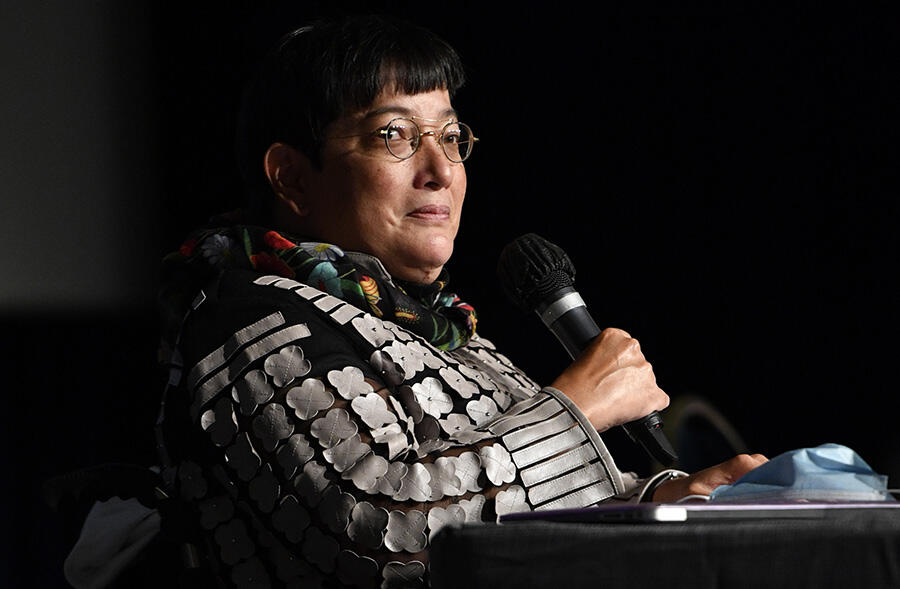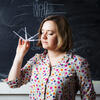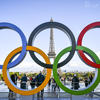You are here
Mai-Anh Ngo, sports and equal rights champion

“A friend of mine came up with the expression that describes me best: a hyperactive PRM – person with reduced mobility,” Mai-Anh Ngo says at the start of our interview, adding with a laugh, “You may not have noticed, but I’m in a wheelchair!” An indefatigable para-athlete and multi-medallist, Ngo is also a lawyer in the GREDEG1. From the perspective of French law, she focuses her attention on the key factors that can hinder the pursuit of sport activities by disabled persons. To identify them, she delves into the details of disability and sport regulations in terms of their application in the realm of parasport. In fact, while legal rules are omnipresent in sport – from those of the game to recourse to justice, and in the organisation of the sporting world itself – the law still lags behind when it comes to parasport. To codify the phenomenon, Ngo relies on the implementation of two principles: accessibility and compensation.
These leverage points are the foundations of the Law of 11 February 2005 on equal rights and opportunities, participation and citizenship of disabled persons. This law provides for equal access to sport facilities and practices for disabled individuals of all kinds. “It also provides, for the first time, a legal definition of disability,” Ngo explains. “Although it still remains pathology-oriented, it nonetheless introduces an environmental dimension: what causes the situation of disability is an ill-adapted environment.” A genuine change of perception, the lawyer emphasises. Although accessibility has been a legal requirement since 1975 (and in theory, all facilities should have been made accessible by 2015), the idea of compensation is new, requiring that all additional costs incurred by disability be covered by the Disability Compensation Benefit (PCH).

This means that disabled persons can define a four-year individual plan in conjunction with the departmental centres for disabled people (MDPH in French), which offer them daily support in all aspects of their lives. But in Ngo’s view, despite the best of intentions, the conditions for implementing this provision have yet to be met. Especially in the area of parasport, where accessibility needs to be improved and compensation, both human and technical, remains limited. The researcher sees two main reasons for this: first, the competitive dimension is relatively recent, and secondly, the specific characteristics of parasport are still undervalued in the French legal system.
From the swimming pool to sports law
Born prematurely, Mai-Anh Ngo is paralysed in all four limbs and the trunk. In 1988, at the age of 13, she went to a disabled sports club, where she was encouraged to try swimming. “At first I wanted to do kung fu, but they told me it wasn't possible,” she jokes. “That same year I went to the France Championships, the qualifying event for the Paralympic Games.”
Impressed by the quality of the swimmers, she already began picturing herself as a member of the France team: “I immediately set my sights on competition.” Her mother taught her the breaststroke, “A stroke that’s not much used by athletes with severe disabilities like mine,” she explains. One year later she joined the French para-swimming team. Ngo competed in the Paralympic Games in Barcelona in 1992 and Atlanta in 1996, and won three bronze medals at the European Championships plus another three at the World Championships.
While attending university, she continued her sports career at the national level, although more sporadically. “I had started working on my thesis on the quality of processed foods,” she recounts. After devoting a decade to the subject, in 2010 she got the idea of linking her life as an athlete (and activist) to her activity as a research engineer. When she proposed to reorient her work towards issues of disability in sport and accessibility, the response from the management of her laboratory in Nice (southeastern France) was positive. “In addition to being an obvious choice, it was a real personal and professional harmonisation,” she says, adding, “Even though I was wary of being seen as the disabled person who works on disability issues.”
Paraperf: higher, farther, stronger… and more disability-friendly
Since 2020, Ngo has been involved in Paraperf2, a project devoted to Paralympism. Under the auspices of the National Institute of Sport, Expertise and Performance (INSEP), the programme has a two-pronged mission: to personalise and optimise para-athletes’ development and equipment, and to ensure that the related technical and social innovations improve the everyday lives of disabled persons in the long term. The focal point of these efforts is the Paris Paralympic Games: from 28 August through 8 September, 2024, more than 4,300 para-athletes (including 1,859 women) will compete in some 549 events encompassing 22 sport disciplines. Paraperf is taking action in three main areas. The first is to maximise para-athletes’ performance trajectories using analyses and personalised decision support tools. The second seeks to optimise the athlete-wheelchair combination (wheelchairs are used in 12 of the 22 Paralympic disciplines, nine of which are being studied as part of the project). The third area, to which Ngo contributes, focuses on the athletes’ preparation and training environment, their psychological condition and well-being, and their socio-economic background. “Our goal is to gain a better understanding of the factors conducive to top-level performance,” the lawyer explains, “and more generally to cultivate a favourable context for preparing for the Paralympic Games.”
In collaboration with researchers in sociology, psychology and law, Ngo set out to evaluate the integration of Paralympic parameters into sports regulations and that of sports specificities into disability law, based primarily on questionnaires and interviews with professionals (para-athletes, staff members, etc.). “The Paralympic model was replicated from the Olympic model without really taking the characteristics of the former into account,” she points out. She began focusing on the participants who were not mentioned in the legal specifications, such as assistants and guides, the able-bodied athletes who accompany the Paralympic competitors. She also addressed the question of human compensation, in particular the recognition of these assistants as high-level athletes. “We realised that some of the tools were unsuitable,” she explains. For example, to register as a pair in a long-distance race, an entrant only needs to indicate that he is blind. “Far from being a detail, this is out of step with the reality of parasport,” Ngo says. “If they aren’t recognised as high-level athletes, the guides don’t have time to train, either with the para-athletes or individually.” In response, she has developed a tool for the FFH French parasport federation that bolsters the status of parasport pairs.
Time to modify sports regulations?
Working with the Paraperf medical task force and the Connected Parasport Health Institute (ISPC), Ngo has examined the regulatory medical checks of para-athletes, which are also “inadequate” according to her group’s conclusions. “It may seem obvious, but one of our main findings was that taking a disability into account, whether it is inborn or acquired, must be the first step in medical monitoring, even before the sports performance.” Stability for precision sports, manoeuvrability for rugby or basketball, problems related to friction or falls: her work has shown that para-athletes cannot be dissociated from their equipment, for which every calibration counts.
More recently Ngo has also been working on e-sport, in particular the inclusion of disabled players in competitions. She cites an example: “I contacted the French sport and Olympic committee (CNOSF) and asked them, ‘What would you do if a disabled video game player won the Fortnite World Championship and lawsuits were filed for breach of equality?’ When it comes to issues concerning people in wheelchairs I feel free to say, ‘It doesn’t work’. Today we are collaborating with the CNOSF on this question. The advantage of the law is that if we succeed in changing it, perhaps not today but within the next few years, we can improve an entire system.”
The Paris 2024 Games: a gateway towards a more accessible France?
In 2020 Mai-Anh Ngo took up parakarate. In 2022 she returned to the podium as France’s national champion in the discipline. “My winning the title in parakarate kata was the culmination of an adventure that began just under 40 years ago,” she recounts. “It was simply magical! Practicing sport has tremendously broadened my perspectives in life, and now I want to offer that possibility to others.”
Beyond performance criteria, the researcher hopes that France’s hosting its very first Paralympic Summer Games and the media coverage of the Paralympic Torch Relay (involving some 1,000 torchbearers) will publicise the issue of inclusion and convey a positive, dynamic image of people with disabilities. “The flame is also a symbol of strength and unity, and it’s in that spirit that I will carry it on 25 August in Antibes (southeastern France),” she adds. Ngo hopes that the Paris Games will result in a genuine legal and social shift towards what she calls “handicracy”. “Disability needs to be taken into serious consideration in all laws,” she insists, “always integrating, from the initial draft, provisions for the disabled.”
Also a member of the CNCPH national disability advisory board, Ngo laments the clear lack of disability awareness among the general population – and especially accessibility – in France. Scooters left on the pavement, rubbish bins blocking the way, shop entrances cluttered with flowerpots… “It’s situations like these, and their repetition on a daily basis, that make it harder for people to live with their disability,” she comments. “It must be admitted that just trying to live a normal life takes extraordinary amounts of energy.” She also regrets the tendency to think of accessibility as being of importance only to a small number of wheelchair users, “whereas it can affect everyone at some point in their lives”. According to her, this cultural deficiency exacerbates the feeling of isolation among disabled people. “A European study has estimated the additional cost of accessibility, when integrated into the construction of a building, at 1% of the total budget,” she concludes. “At that price, all new buildings should be accessible.” ♦
- 1. Groupe de Recherche en Droit, Economie et Gestion (CNRS / Université Côte d’Azur).
- 2. For “Optimising Paralympic performance: from detection to medal winning”. Paraperf is the largest French scientific consortium dedicated to parasport: 13 laboratories and 38 researchers with a budget of more than €2 million as part of the France 2023 scheme, under the auspices of the “Very High Performance Sport” Priority Research Programme (PPR). Its stated objective: to increase the number of medals awarded to the French delegation at the Paralympic Games.
Explore more
Author
Anne-Sophie Boutaud studies scientific journalism at the Université Paris-Diderot. She holds a degree in history and political science.




















